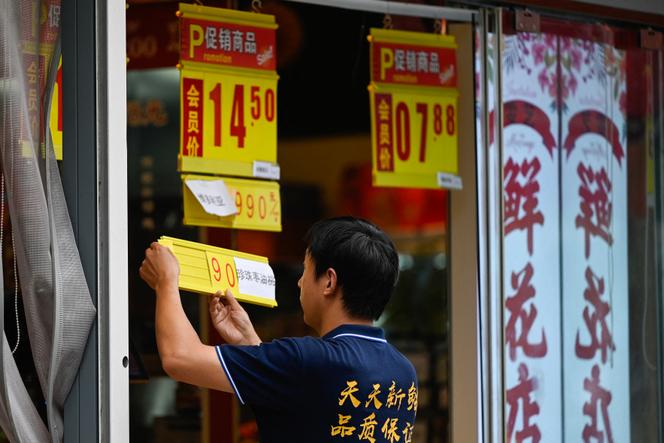


The bad news just keeps on coming for the Chinese economy. After a sharp decline in foreign trade figures on Tuesday, August 8, the government announced on Wednesday that the country had entered a deflationary phase. In July, prices fell by 0.3% for the first time since 2021. In this case, however, economists are worried that the trend could last. Prices were already stagnant in June. On average, they rose by just 0.5% over the first seven months of the year, far from the 3% target set for 2023.
This trend indicates low household spending and the country's difficult economic recovery, eight months after the abandonment of the Zero Covid policy. While most countries in the world are now suffering from inflation, deflation is an equally painful economic phenomenon that can create a negative spiral, due to the fact that consumers tend to postpone purchases when they see that prices are falling.
According to a note by economists from the consulting firm Trivium, "[Chinese consumers] are not spending because income growth has slowed and the economic outlook remains uncertain. [...] Until these problems are resolved, consumption will not pick up significantly."
The end of the drastic Zero Covid policy had raised hopes of a recovery, but this never materialized. So far, the Chinese have been going out and traveling, but they are reluctant to spend at home. After a slight rebound in growth in the first quarter, second-quarter activity was only 0.8% up on the previous quarter. Against this gloomy backdrop, young people are the hardest hit, with unemployment reaching a record 21.3% in July.
On Tuesday, the Chinese customs authorities published some worrying figures, showing that the world's leading exporter posted foreign sales down 14.5% in July, a bigger drop than the 12.5% anticipated by economists. Imports hardly fared better, down 12.4%. This is the steepest fall since February 2020, at the start of the Covid-19 pandemic.
The slowdown in the global economy largely explains the decline. Western countries are experiencing inflationary pressure, which they are attempting to counter by raising interest rates. In addition, the effects of the "risk reduction" policy toward China pursued by certain countries, "are beginning to be felt," said Alicia Garcia Herrero, chief Asia economist at Natixis. "There is concern about Chinese exports in sectors such as electric vehicles. Everyone wants to diversify their sources, and this is starting to show."
At the end of July, the government acknowledged that the economy was "facing new difficulties, mainly insufficient domestic demand." It promised to "strengthen adjustments and counter-cyclical policies." Since then, concrete measures have been slow in coming, despite announcements aimed at restoring confidence.
You have 39.75% of this article left to read. The rest is for subscribers only.
